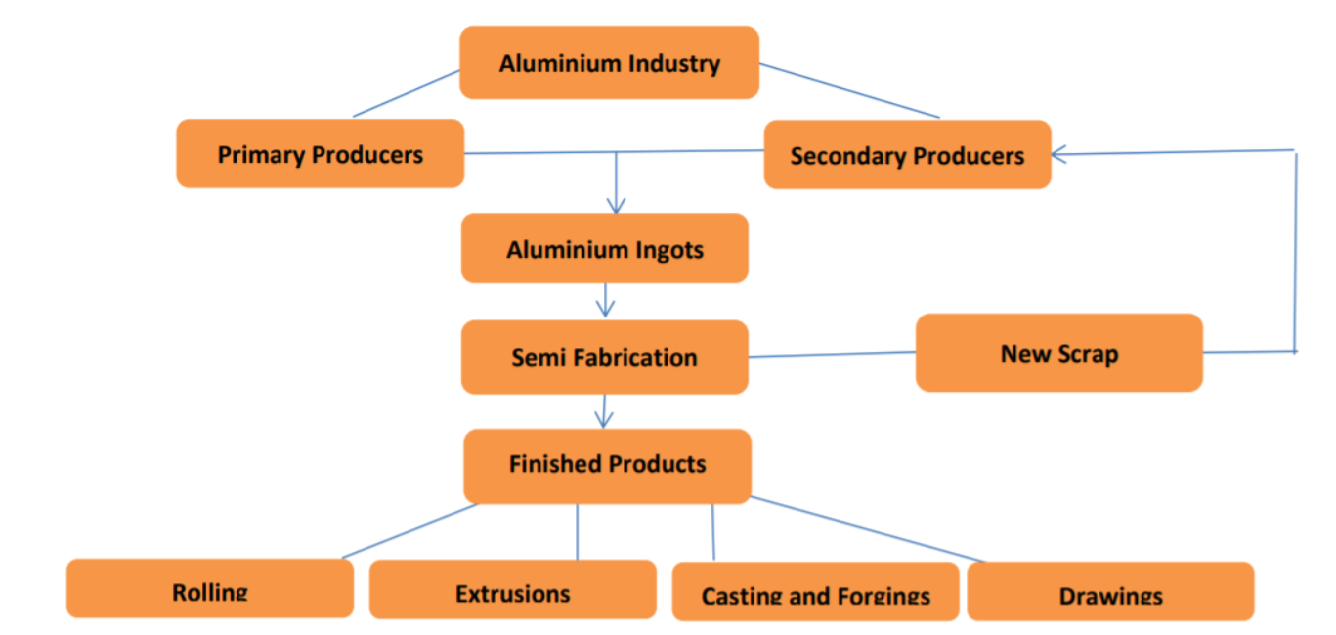Brief Introduction to Aluminium Ingot
Anonymous
2022-06-25
Sure we see aluminium or products made of aluminium around us in our daily lives, but little do we know about the value chain of the metal. So, this is the space today to get acquainted with aluminium, talking of which ingot is the pure form of metal cast into a shape suitable for further processing. Aluminium ingots are heated past its melting point and cast into a bar or block using a mold chill method. Molds are available in different shapes and sizes, lending ingots a variety of appearances.
Now when we know what aluminium ingot is, let us learn how they are made. In the cast house, crucibles of molten aluminium empty their silvery liquid either directly into molds or into a holding furnace where the metal is kept molten at temperatures between 1200 and 1500 degrees Fahrenheit. Then 400kA electrical currents are passed through the mixture to break the bond between the aluminium and oxygen. The result is 99.8% pure aluminium.
The process of casting aluminium ingots takes place through majorly two routes - either from alumina through primary aluminium or the fusion and refining of aluminium scrap. Ingots obtained through the first type of process are called primary ingots and the second type is called secondary ingots. Depending on the purity of ingots, they can also be pure or alloy ingots.
Types of aluminium ingots
Aluminium ingots are produced through the smelting process. Various grades of ingots are produced which are used for the production of castings in the auto industry as well as electrical applications. Ingots of various dimensions come with a maximum purity of 99.7%. Ingots are the material that is cast into a shape suitable for further processing. Ingots usually require a second procedure of shapings, such as cold/hot working, cutting, or milling to produce a useful final product. Aluminium Ingots are re-melted and further processed into a large number of products for various downstream applications.
- Primary aluminium ingots – these are ingots of the unalloyed or alloyed aluminium cast from primary aluminium
- Secondary aluminium ingots are those obtained by recycling scrap
- Remelt ingots are those suitable for remelting. Those include large ingots called “sows” (~ 500 kg) and small ingots called "pigs" (less than 25 kg)
- Extrusion ingots are intended and suitable for extruding, typically of solid circular cross-section, sometimes with a central hollow or a flattened cross-section
- T-Ingots are shaped in tri-lock shapes and designed for efficient and secure handling, are used across the construction industry, transportation, electrical goods to household appliances, T- ingots are re-melted to produce a wide variety of end products that cover the entire spectrum of aluminium applications.

A large proportion of aluminium ingots (in particular for sheet and extrusion applications) are cast by the semi-continuous, vertical direct-chill casting process (DC Casting), where water is directly sprayed onto a solidifying ingot installed on a descending platen.
APPLICATION OF ALUMINIUM INGOTS
Aluminium ingots can be used in different sectors, including automotive, household appliances, lighting, construction, mechanics and household goods. The ingots are sent to other processes or flattened into thin sheets, which are then used to make new cans. Aluminium is becoming a favourite with architects and builders opening up a potential for increasing the use of metal in the construction industry. Likewise, the use of metal is increasing in the auto sector with an increasing need for lightweight automobiles across the world.
Globally, almost all large companies like Alcoa, Rusal, Rio Tinto, Chalieco, Vedanta, Nalco, Hindalco, etc. make their ingots and trade as well. Mid-sized and smaller companies usually buy ingots from larger players as the cost of smelting is usually very high. In the global scenario, many countries do not produce primary aluminium and their aluminium industry is directly reliant on buying ingots from other primary aluminium-producing nations.
Categories
Raw Materials
Scrap
Consumables
Primary Aluminium
Secondary Aluminium
Equipment
Technology
Downstream Products
Finished Products
Utilities
Services
Others
Recent Blogs
Subscribe to newsletter
Connect with us











